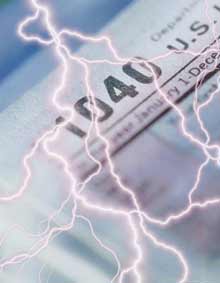Remember when you refinanced your home mortgage to get a lower interest rate and pay less every month?
How quaint. And how utterly out of date. Now the rage is refinancing into a higher interest rate -- yes, you read that correctly -- while pulling out buckets of fresh cash.
Almost nine of 10 homeowners who refinanced during the second quarter of this year cashed out additional money -- often tens of thousands of dollars -- according to mortgage investment giant Freddie Mac. The 88 percent cash-out refinancing rate was close to the all-time record and could surpass it later this year.
Meanwhile, the typical refinancer hasn't been scouring the market for an interest rate lower than that on his existing first mortgage. To the contrary, according to Freddie Mac, most refinancers are opting for larger replacement first mortgages with rates averaging about one-half of a percentage point higher than on their old loans.
Cash-outs may be booming, but they are not a new phenomenon. They've existed for years as a financial tool to extract equity tied up in real estate and convert it to immediately spendable money. During the refinancing boom of 2003 and 2004, for example, anywhere from a third to half of all refinancers pulled out additional cash. However, the overwhelming majority of borrowers during the go-go refinancing years chose traditional rate-reduction replacement mortgages in which new balances approximated the old balances and the new monthly payments were lower.
Scroll ahead to mid-2006: Short-term interest rates no longer hover near 4 percent. Thirty-year fixed-rate first mortgages no longer are less than 6 percent. Now the prime rate is 8.25 percent and could move higher. Standard 30-year mortgage rates are nudging 7 percent. Home-equity credit lines are slumping as their adjustable rates -- typically set one or more points above the bank prime -- start racking up bigger monthly costs.
Now consider the near-record pace of cash-out refinancing: Say you need $40,000 to $100,000 for a home renovation, a business investment, a down payment on a vacation property or consolidation of high-cost consumer credit debts. Say you also have lots more than $100,000 sitting untouched and frozen in home equity. Rather than signing up for a home-equity credit line tied to a jumpy and unpredictable prime rate plus 1 percent, you instead choose a fixed-rate cash-out refinancing.
In effect, you trade in your existing first mortgage -- say it's at 6.25 percent -- for a replacement at 6.75 percent. Plus you pull out the money you need and add it to the principal balance of the new loan. Yes, your monthly payment will be higher than what you were paying on the old loan, and yes, you will have transaction costs, which you might be able to roll into the new loan amount. And yes, your total first mortgage debt may be significantly higher than it was.
But then again, would you be happier with a $100,000 credit line with a floating rate potentially heading for double digits?
Amy Crews Cutts, Freddie Mac's deputy chief economist, says another factor at work in the big shift to cash-out refinancing may be the estimated $500 billion in adjustable-rate first mortgages that will experience rate resets this year, plus $650 billion in second mortgages and equity credit lines that will adjust upward.
Many homeowners want out of those mortgages -- especially those with 40 percent and 50 percent payment increases at the first reset. Refinancing into standard fixed-rate loans suddenly looks attractive. And if homeowners can pull out some cash in the process, that's fine, Cutts said, because "many people see that their real estate has been one of the only things making money for them during the past few years." Plus they have confidence that home real estate remains a solid investment -- even in the face of a slowdown in appreciation rates, she said.
Another key to the cash-out refinancing boom, according to Cutts: "Borrowers have developed new ways of thinking about their home mortgages," and increasingly see them as positive resources -- not just debt loads -- to be used to achieve other personal financial objectives.
Should you consider a cash-out refinancing? Not unless you have a good reason: You really need the money, you don't want to play roulette with an adjustable-rate equity line, you want to lock in your mortgage debt at a relatively low long-term fixed rate.
Check out fixed-rate second mortgages, as well.
They may have lower transaction costs, and some banks are pricing their rates on seconds to compete directly with cash-outs.
--------------------------------------------------------------------------------------------------------------------------------------------
Kenneth R. Harney is a nationally syndicated real estate columnist with the Washington Post Writers Group. His e-mail address is kenharney@earthlink.net. © Washington Post Writers Group

